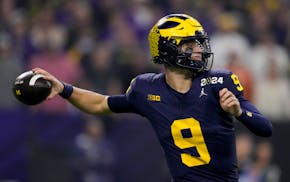We all want it all. We want succulent food and slim waists, powerful engines and great gas mileage, suntans without skin damage.
As an organization attuned to the desires of its remarkably loyal fans, the Wild has tried to have it all, tried to field playoff teams while amassing young talent. Predictably, the new front office, in pursuing those two sometimes mutually exclusive goals, has struggled to balance instant gratification with responsible planning.
With the trade of Martin Havlat to San Jose for Dany Heatley, Chuck Fletcher once again has made a move that doesn't help his team rebuild, a move that could be considered a risk because of Heatley's problematic past.
In two bold exchanges with the Sharks, though, Fletcher might have accomplished the improbable. He might have improved the Wild's chances of winning this year, while increasing their chances of winning five years from now.
Trade analyses are as fraught with risk as trades themselves. The final verdict on them can turn on injury or a team's fortunes, can be subject to locker-room chemistry or coaching ingenuity, or even change from year to year.
At this point, Fletcher deserves praise for both of his recent trades, because he addressed his franchise's two biggest needs, scoring and young talent, without sacrificing players who were part of his long-term plan.
To acquire Heatley, Devin Setoguchi, Charlie Coyle and Zack Phillips, he dealt Brent Burns and Havlat. Burns was likely to leave in free agency in a year, and Havlat was, like Heatley, a 30-year-old forward with wonderful hands and a problematic past.
Havlat helped cost Todd Richards his job and fought with captain Mikko Koivu a day after Havlat's agent complained about his role. The guy was a nagging headache.
The Wild didn't "win" either trade. San Jose had good reason for making both deals. The Sharks acquired a defenseman with All-Star ability and a forward whose deft passing should complement his new teammates. The Sharks are built to win now, and they acquired two players who should help them do that.
Fletcher faced a more difficult challenge, in serving the win-now mentality of the team's owner and fans while stockpiling young talent for a franchise that was stripped bare by the Risebrough cadre.
Even if Heatley proves problematic, he possesses one major advantage over Havlat: He scores goals, at least in the regular season.
On a team filled with pass-first players, Heatley is likely to become the Wild's top shooter and top scorer. At worst, the Wild will have traded a sinus headache for a migraine.
On a conference call Monday, I asked Heatley if he relishes joining a team where he'll be expected to become the go-to scorer. "I do," he said. "I think as a goal scorer and a player, you want to be that guy."
The Wild needs that guy.
Setoguchi upgrades the Wild's speed, as well as scoring ability. Coyle is a top prospect. And if it's true that groin and hand injuries limited Heatley's effectiveness last year, he could, if healthy, become the Wild's first true star since Marian Gaborik left.
Give him this: Fletcher has guts. He's taken the risky route by hiring two unproven NHL coaches, and he has not been afraid to make big (and by definition risky) trades.
"Our inability or unwillingness to shoot the puck was well-documented," Fletcher said. "Our plan was to aggressively add as many young assets as we could and to find a way to improve the offensive capabilities of our club going into next season ...
"We feel we're a better organization in the short term and long term today than we were entering the offseason."
Fletcher, in two weeks, has simultaneously made the Wild more exciting and more promising. That's hard to do.
Jim Souhan can be heard Sundays from 10 a.m. to noon and weekdays at 2:40 p.m. on 1500ESPN. His Twitter name is Souhanstrib. jsouhan@startribune.com

Souhan: Wolves fans made Game 1 special. Now bring on Game 2.

Souhan: Should Vikings even consider McCarthy in NFL draft?

Souhan: NAW erases Suns' lead, Game 1 advantage with big performance

Souhan: This is KAT's chance to prove Flip Saunders was right

